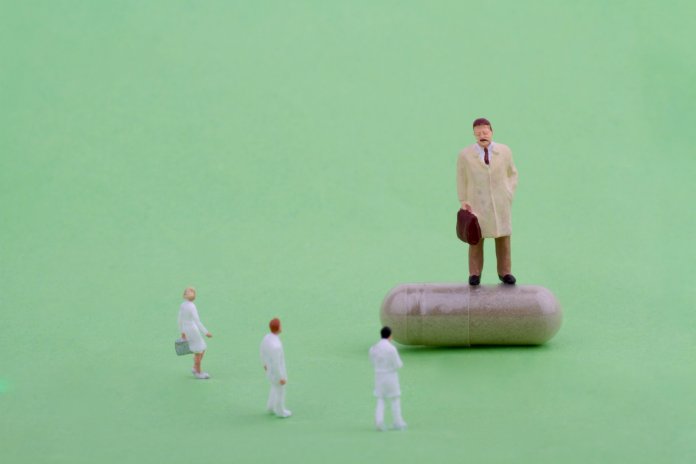The first time a pharmaceutical sales rep came in to see me as a patient, I admit I was a bit surprised. I think I may have even made a joke: something like “welcome to the dark side.” Since then, I have seen many big pharma employees as patients, and they are some of the most stressed out people I know. In large pharmaceutical companies, business is a hustle… especially for the sales team. These companies want their sales reps to peddle their products to doctors who are notoriously busy, and they sometimes have to go to great lengths to meet sales targets. They work very hard trying to get their company’s products into the hands of doctors, and are rewarded handsomely for meeting sales targets.
This is business as usual in the pharmaceutical world, but sometimes, these companies go way too far.
Recently, the New York Times reported on the heartbreaking story of a young pharmaceutical representative who ended his life because the pressure of his job drove him over the edge. Ashish Awasthi, who worked at Abbott Laboratories in India, jumped in front of a train, with the following suicide note in his pocket:
“I’m going to commit suicide because I can’t meet my company’s sales targets and my company is pressuring me.”
Heartbreaking. Mr. Awasthi left behind a wife and two young children. His wife, Anita, said that when he was hired as a salesman in 2013, he was elated. The family bought a car and an apartment, and according to his wife, life was “perfect,” until he was placed under a new manager, who put grueling pressure on the representatives to sell.
According to the New York Times, which performed a six-month investigation on Abbott Laboratories and the pharmaceutical market in India, this pressure included expectations to meet doctors early in the morning and late in the evening, and to allegedly hold “camps” during which sales reps had to test and diagnose patients with various diseases, in order to send them to certain doctors who would then prescribe Abbott’s pharmaceuticals. These representatives do not hold medical degrees, and this practice is illegal. Nethertheless, it is a common one. Abbott Laboratories denies that there was any illegal activity, but from reports, this is questionable.
Former Abbott employees have also reported that the company forced them to pay for medications out of pocket, and to provide kickbacks to private wholesale companies. Maynak Pandey, a colleague of Mr. Awasthi, told the New York Times that he felt such pressure to meet targets that he bribed doctors with his own money. Mr. Pandey quit his job this year, saying he had been broken mentally.
Anita Awasthi stated that her husband had a meeting with his manager the day he ended his life. She thinks that he was afraid he would lose his job. Regarding Abbott Laboratories, Ms. Awasthi told the New York Times: “He died because of them. They must take responsibility.”
My first thought upon reading this tragic news is that this man’s death could have and should have been been prevented. This was a case of “occupational suicide.” Mr. Awasthi’s company pushed him so hard, and he was under so much pressure to meet his targets, that he snapped and ended his life. This is deeply disturbing, entirely unnecessary, and far too common.
Occupational stress comprises a huge chunk of overall stress for many people. It can drive us to insomnia, anxiety, depression, and all sorts of other medical problems. It is rare for me to see a patient who does not report some level of occupational or financial stress in their lives. Of course, most people don’t take it to the extreme like Mr. Awasthi, but so many of them do experience a gradual decline in health — both physical and mental — that is directly associated with occupational and financial stress.
The profit motives of the pharmaceutical industry are aggressive, and often egregiously so. We see this in super-inflated drug prices, questionable research practices, and of course within the sales force. It’s scary to think that pharmaceutical companies are pushing people to these extremes to sell their products. Hopefully, the news of what happened to Mr. Awasthi will shed some light on an industry and profit motivated practices that have clearly crossed the line.
Let me be clear: Even as a naturopathic physician, I am not anti-pharma. Pharmaceutical drugs have their place within the medical industry… they do save lives and relieve suffering. That said, they are entirely overused, especially when simple changes to diet and lifestyle are effective alternatives. It’s a shame that we are so reliant on pharmaceutical products when so many of the conditions that these drugs treat can be prevented with non-pharmaceutical options. There are many medicines that don’t come on the form of a pill:
– Food is medicine
– Movement is medicine
– Sleep is medicine
– Stress management is medicine
– Clean living is medicine
– Meaningful and supportive relationships are medicine.
Many of the products that pharmaceutical companies are pushing into the hands of doctors, and into the medicine cabinets of patients, do not even need to be used, as the conditions they treat are preventable. These drugs should not be our go-to solution: lets shift our focus to prevention and treatment with safe, natural solutions.
– Dr. Joshua Levitt


